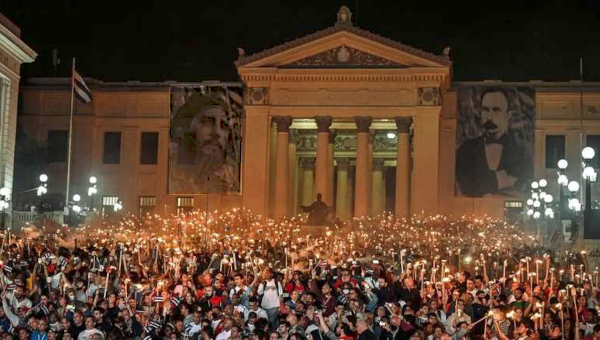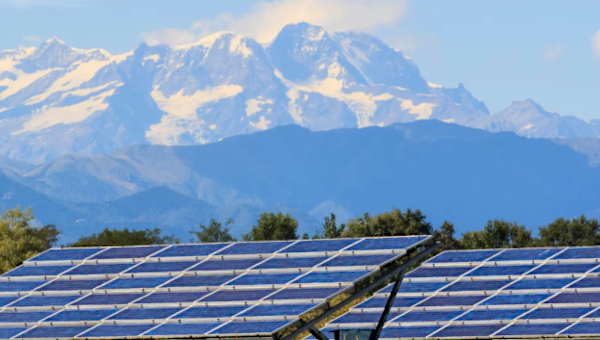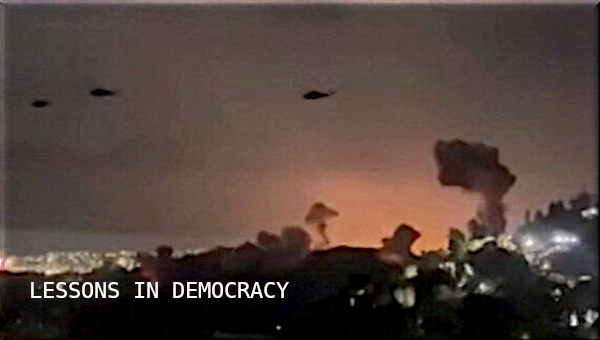An Interview with Héctor Madera
Jeffery R. Webber and Susan Spronk (JW and SS): We’re here in Caracas, Venezuela, with Héctor Madera, one of the founders of the Comités de Tierras Urbanas (Committees of Urban Land, CUTs) and member of Movimiento de Pobladores (Poor Peoples’ Movement, MP). As an introduction, can you tell us a little bit about your personal history and political formation?

Héctor Madera interviewed in Caracas, Venezuela, 6 August 2012.
Héctor Madera (HM): I was born in the barrio called Candelaria in Caracas. I’m going to tell you about my personal trajectory in a popular way. I was living with my grandma when I was 8 or 9 years old. And the Left was functioning clandestinely out of necessity in the 1950s and 1960s. It was craziness. And my grandma passed on the craziness, every day I got crazier (smiling). Part of this craziness she passed on was how not to live as a consumer, how to live in a different way. I was taught that living as a consumer was the real craziness, we get confused that consumption is a way of life. When I was given anything as a child, my mother and my grandma would gather around and teach me that it wasn’t mine – all the men and women in my community would teach me this, how to live in the form of a collective.
Let me give an example that I remember clearly from my grandma and my mother. I was given a pair of shoes. I took care of these shoes like you wouldn’t believe. When other kids would come around and look at my shoes I used to yell at them to get away from my stuff. And my mother and grandma scolded me. Those aren’t yours, they would say, they are for whoever needs them. Try to imagine this kind of formation, education – that these things aren’t ours, we don’t live for consumption, these things are for those that need them. This is how I became who I am today.
JW and SS: Can you tell us about the history of your barrio?
HM: When this barrio was born, it was born like every barrio in Caracas, through hard work. In the mornings, my parents, and my grandparents, would go far away to work, in factories and other sorts of labour, in order to earn money. And in the evenings, they helped build the barrio. This barrio, like all the others, was self-produced, and self-produced with a tremendous labour, and self-produced by women and men.
JW and SS: What was the objective in forming the Urban Land Committees?
HM: The Urban Land Committees were created following a proposal that was approved by the Minister of Labour at the time, María Cristina Iglesias, and Hugo Chávez but it came from below. There was a discussion about this proposal in the barrios outside the city, at the margins of everything. Many people participated in this discussion, and because of this pressure from below Chávez announced Decree 1666, on February 4, 2002.
The new law opened up an initial stage in the struggle for land in urban areas. Remember, Chávez was still a social democrat at the time. He was still speaking like the Workers’ Party in Sao Paolo, Brazil, or Tony Blair in England. But the difference with Chávez is that Chávez listened, he discussed things with the people. And the real force of the Bolivarian process emerged out of the Urban Land Committees and the Barrio Assemblies.
So, in 2002 the legal space was opened up for land titling. The Urban Land Committee was a product of decades of struggle, beginning with our grandparents and ancestors, which led ultimately to opening up this legal space. It wasn’t the legal decision that made this happen, it was the people gathered in the Barrio Assembly.
JW and SS: After a number of years in this process of change under Chávez, can you describe, from your perspective, the strengths and weaknesses of the Bolivarian process to date?
HM: I don’t see the strengths as some sort of miracle, the best thing in the world, but what we have achieved is a maturation of an organic political process. And the biggest obstacle we face today is bureaucracy, bureaucratization. But this is part of the struggle. I’m not going to say that there aren’t petty-bourgeois Ministers, and Ministers who are similar to those in the past, because this is what we have. But those of us in the movements are organizing and articulating ourselves in order to overcome these obstacles. The good thing about the present moment is that there is no political persecution. We can continue organizing and building and we won’t be persecuted. And the state is forced to make concessions. When there is organic popular organization, it has an effect on the state.
JW and SS: In your barrio, what are the most important popular organizations?
HM: This is an important subject for us in Candelaria. We have the House of Culture, which is the centre of everything. Then we have the Urban Land Committees that emerged from the political conjuncture, then the technical water forum working on the theme of water, then the Bolivarian Circles, and the Communal Councils. The Communal Council integrates and articulates all the different organizational forms – the Urban Land Committees, and the committees around water and health.
“…in the Commune, neither the bourgeois nor the proletarian state exists, but rather the people themselves, living in common and harmony with the Pachamama (mother earth) and ourselves. This is the dream, which demonstrates that another world is possible.”
It is also important to mention that in the current context Communal Councils are then articulated in Communes, which emerged later, and the Commune is nothing else but the expression of the demands from below, an expression of living collectively. It’s a form or organizing that avoids getting caught up in the new state – because the state is an apparatus of oppression, of one class over another. In the case of Venezuela, the bourgeois state has its apparatus, and the proletarian state has its apparatus. But in the Commune, neither the bourgeois nor the proletarian state exists, but rather the people themselves, living in common and harmony with the Pachamama (mother earth) and ourselves. This is the dream, which demonstrates that another world is possible.
JW and SS: How does the Commune maintain this independence, this autonomy, from the state?
HM: To begin with, for me, autonomy means the purest expression of individualism, even though Antonio Gramsci and other Marxists with the best kind of theoretical framework used this idea. Look, autonomy is ‘auto’ and ‘auto’ is one person. I therefore believe more in independence and sovereignty than autonomy. Our independence and our sovereignty requires that I recognize you and you recognize me, and that neither of us rises above the other. Rather, we recognize each other, we respect each other, and we work toward consensus. If we don’t try to work toward consensus amongst each other, we don’t respect each other. If you’re only worried about yourself, your autonomy, there we have individualism, which negates everything we’re trying to do. Individualism, as such, is the negation of life itself, the negation of our dreams.
I understand that, for now, we need the state. But to the extent that the revolution advances it will require social articulation, that expands, eventually encompassing Europe, Africa, North America, and the state in such a process will ultimately be nothing but a trap.
JW and SS: Can you speak about what has happened with the initiative to develop Empresas de Producción Social (Social Production Enterprises, EPS)?
HM: This experience in its entirety never had the necessary force behind it, to be the authentic seed of our dreams, to produce a distinct form of production. Because what did the bureaucracy, bureaucratism, or the ‘Red Right’ do [editors’ note: bureaucrats who pretend to be Chavistas but are ideologically conservative]? It destroyed and corrupted this initiative. This experience that everyone from below was supporting and attempting to participate in was destroyed. The idea was that in the first instance, the producers themselves, the workers of the enterprise would control the EPS and secondly, decisions about what would be produced would be made through the Commune, and the government itself.
But what happened? An exclusive relationship developed between the government and the Commune that ignored the community, which disallowed active participation of the people of the community. And so the communities themselves never controlled the EPS and never enjoyed the fruits of their labour. Production has to be collective and distributed to the people in its entirety; otherwise it’s just another farce. The ethic of each person contributing according to their capacities, and receiving according to their needs, has to be the basis of production all the way to the highest levels, in the production of oil, iron, and so on. This is what social production should mean, and as such it would transform Venezuela, authentically, into an example for the world, to achieve something that’s never been achieved. In 1936, the Spanish in Catalonia began to live like this, but it didn’t last. If it didn’t last in 1936 in Spain, it must be realized in the Venezuela of today, to become the most genuine expression of the dream to transform society.
But we encounter internal enemies within the Bolivarian process, when we attempt to move toward such social production, alongside external enemies, and the obstacle of our own consciousness. The last of these is an especially serious problem for turning toward real social production. But I know that we can do it. This kind of production can be constructed. But this isn’t a problem of Caracas, this isn’t even a problem of Venezuela, this is a problem that faces humanity as such, a problem for all nations. The problems facing Italy, Greece, Spain, and others at the moment, for example, require the transcendence of liberalism, the socialization of production. We need more and more people to assume this struggle, to experiment and to learn how to socialize production. And this means going much beyond what you asked me in your question, beyond the EPS idea. We need to multiply this idea, and to have more and more people involved.
JW and SS: Since 2005, Chávez has employed the rhetoric of Socialism for the Twenty-First Century. From your perspective, what does this kind of socialism signify?
HM: I share the idea of twenty-first century socialism with Chávez up to a certain point, with some reservations. What are my reservations? First of all, transnational and national corporations continue to control production in Venezuela, and how is the bourgeoisie going to produce socialism? This is a lie. But I understand the posture of the government, in its attempt to push this agenda forward. And there are confrontations with the bourgeoisie, between the government and the bourgeoisie.
We require technical assistance and knowledge, in engineering, architecture, sociology, anthropology, but we need to put these disciplines at the service of the people, rather than placing the people at the service of these disciplines, which is still the situation here in Venezuela. The socialist community, the Bolivarian Revolution, has made some advances, but very tiny advances toward socialism, through the community councils, and popular movements. But private enterprise continues to control 80 per cent of production, the inverse of what it should be by now.
So the socialist community in Venezuela doesn’t always use this discourse of twenty-first century socialism, but insists instead that transnational corporations – whether they are from China, Belorussia, or wherever, are nothing but transnational corporations seeking profits. They’re savage capitalist enterprises, and nothing else. They pursue profit. So the question is how to really break with all of this, and how to assume control of things.
JW and SS: What is the importance of the political transformations in the rest of the region in the Bolivarian process?
HM: The international oligarchy is opposed to the process that is taking place in Venezuela. The importance of the process in Venezuela is that the transformation is social, about the people; it is not just an economic transformation. Chavez is the spokesperson for this process, also various Ministers and people who work in the state. This tendency is growing and continues to grow. Lately, the bourgeoisie in other parts of the region such as Uruguay and Paraguay have benefited from the process in Venezuela, and they declare their allegiance to this battle cry but have benefited from moving toward the centre. The real conversation, however, is taking place between people in their neighbourhoods, in their organizations; the conversation begins and ends here. It is the only way that the myth of living in peace in capitalism can be exposed as just that, a myth, and that peace will become a reality. It is impossible to live in harmony under capitalism, because all capitalism cares about is how to reproduce itself. All capitalists care about is profit. When we are demonstrating that another world is possible, that another logic is possible, capitalism’s myth of progress and happiness is revealed as such.
JW and SS: What steps has your barrio taken to unite the popular forces and overcome the divisions of race and gender, etc.?
HM: I will answer this question by talking about gender. This problem has been relatively easy to overcome because the majority of participants who run the popular organizations are women. So it is women who are creating the political world, while the men collaborate economically. Women are reclaiming their sovereignty, the sovereignty that they have always had. But it appears to me, that the problem is really about class. After all, Margaret Thatcher is a woman but she reproduces a discourse of capital. Indeed, what is really messing us up is capital. We need to produce differently. The problem of capital is not just a problem of women or men; it is a problem of class.
JW and SS: People talk a lot about the problem of security. What have been the popular strategies to confront this problem?
HM: This question makes me laugh – the question of security. Why does it make me laugh? The majority of the victims of violence are poor people, the proletariat. How do you explain the fact that there is always theft? It is the product of a country that maintains the logic of capitalism. Venezuela is looking to move toward creating a different system. For now, however, you will find more police stations in the wealthy districts of Caracas, such as in the shopping malls, but no police stations in the marginal barrios. The problem of violence is diminishing with greater social equality. Before Chavez was elected, there was a high level of poverty of 40-50% of the population; now it is only 18-20%. The poor people now have food to eat thanks to the social programs. The Bolivarian Revolution has invested billions of dollars in social programs.
JW and SS: What is the importance of the presidential elections to take place on October 7, 2012?
HM: The opposition knows that we have them beat 7 to 3. They have no chance. I will give you an example. The opposition decided not to participate in previous elections, as in 2004 when the PPT, the MAS, etc… all withdrew from the electoral process. One of the good things that Chavez is doing is registering all the citizens of the country so that they can vote. There are still important struggles taking place. We must remember the fact that there are over 1,500 peasants who have died in the struggle for land in the past years. 400 people from the urban land committees have also died in the struggle for land. Politicians have also been killed. We are still saying that, ‘This is democracy.’ It is still important to see the revolution from this perspective. •





